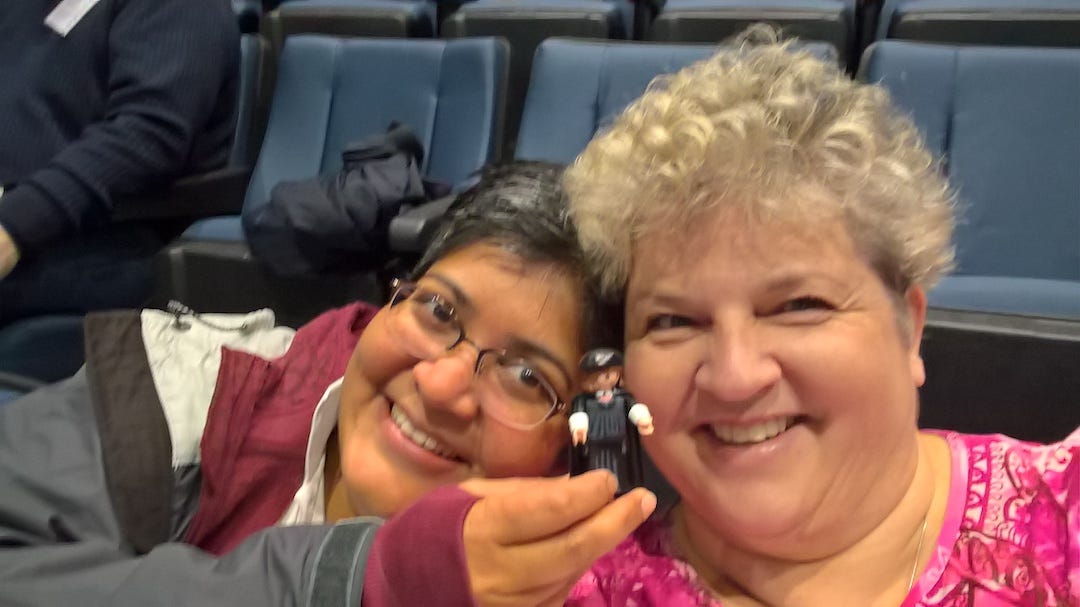As I write this, I am surrounded by candles and the hum of a generator going in the background. We’ve had a freezing rain event in Ontario, and Tobermory, where I live, has been quite hard hit. Perhaps this is for the best, as today’s study is a particularly intimate sharing, and I’m not due to get power back until Wednesday night. So, this week we will only have the study posted. I will call off this week’s zoom gatherings. I encourage you to go through the study process and questions, and email me any thoughts, reflections or questions you may like to share (janakibandara@diohuron.org). If I get enough feedback, I’ll schedule a make-up zoom when the power is restored and I feel a bit more brave!
This week’s study looks at a personal experience I had which I could only understand as racism. It looks at how that experience felt like a first arterial nick, from which a bleeding process began - a process which is finally beginning to heal amidst the love and community I am encountering, post-pandemic (and post ice-storm), right here in Tobermory. The podcast article can be found in full print here. The study process is similar to the last three weeks study process, except for the cancellation/postponement of the zooms this week, due to power outages and vulnerability overload on my part! Enjoy!
Noticing Our Responses - Experiencing:
As we did with our previous studies, I invite you to listen or read the post entitled “Stop the Bleeding”.
As you listen, make note of where you feel contracted or resistant to what you are hearing (eg it makes you shake your head, curse inwardly or under your breath, makes you feel fearful, angry or other negative feelings).
Make note also of where you feel expansive and resonant with what you are hearing (eg it makes you smile, chuckle, warms your heart, or makes you nod in agreement, gives you positive feelings).
Once you have listened and noted your inner responses, spend a little time considering these questions. I encourage you to take notes, and email me if you feel so inclined.
Some questions of experience:
What experiences of racism, if any, have you ever directly had?
Have you have ever found yourself behaving in racist ways, as I did? How might you turn these behaviours around?
What experiences, if any, have friends or loved ones had of racism that they have shared?
What experiences, if any, have you had of exercising racial privilege in a conscious way?
Next - Experiencing & Noticing from other contexts:
We hear on the news, and see in the media, many stories of racial discrimination. Some of these stories are presenting in political policies and procedures.
When you go to a gathering, do you notice if there are any visible minority groups present? Are there ways in which you can extend visible signs of friendship and community to those who are visible minorities in such settings?
Within your community, and your circles of friends, is there racial diversity? How might you broaden the racial diversity within your circle of friends?
Where systemic racism is identified within an organization, how might you advocate for dismantling of such systemic racism? What actions of resistance might you take?
Connecting our Responses with Scripture:
How do we understand the scripture about loving our neighbours as ourselves?
Luke 10:25 - 28 [// Matthew 22:34-40, // Mark 12:28-33]
25 On one occasion an expert in the law stood up to test Jesus. “Teacher,” he asked, “what must I do to inherit eternal life?”
26 “What is written in the Law?” he replied. “How do you read it?”
27 He answered, “‘Love the Lord your God with all your heart and with all your soul and with all your strength and with all your mind’; and, ‘Love your neighbor as yourself.’”
28 “You have answered correctly,” Jesus replied. “Do this and you will live.”
[NIV]
How do we identify neighbours? Are they mostly people who look like us? And how does the parable of the Good Samaritan inform our identification of neighbours?
In loving your neighbours as yourself, how might you advocate - help with bandaging and healing, as the Samaritan did in the story?
Luke 10:29 -37 (The Parable of the Good Samaritan)
29 But he wanted to justify himself, so he asked Jesus, “And who is my neighbor?”
30 In reply Jesus said: “A man was going down from Jerusalem to Jericho, when he was attacked by robbers. They stripped him of his clothes, beat him and went away, leaving him half dead. 31 A priest happened to be going down the same road, and when he saw the man, he passed by on the other side. 32 So too, a Levite, when he came to the place and saw him, passed by on the other side. 33 But a Samaritan, as he traveled, came where the man was; and when he saw him, he took pity on him. 34 He went to him and bandaged his wounds, pouring on oil and wine. Then he put the man on his own donkey, brought him to an inn and took care of him. 35 The next day he took out two denarii and gave them to the innkeeper. ‘Look after him,’ he said, ‘and when I return, I will reimburse you for any extra expense you may have.’
36 “Which of these three do you think was a neighbor to the man who fell into the hands of robbers?”
37 The expert in the law replied, “The one who had mercy on him.”
Jesus told him, “Go and do likewise.”
[NIV]
Thank you for reading. If you would like to join the group study please subscribe or email me at janakibandara@diohuron.org to get the Zoom link for Monday at 7pm or Wednesday at 2pm. Although we won’t have a ZOOM study time this week (due to hydro outage), I hope to continue our zoom study times next week.
“microaggression” - a comment or action that subtly and often unconsciously or unintentionally expresses a prejudiced attitude toward a member of a marginalized group (such as a racial minority) https://www.merriam-webster.com/dictionary/microaggression
Photo credits to Sylvia Swiatochik and two chairs Photo by Paul Zoetemeijer on Unsplash
My own father used the colour of our skin to intentionally seek privilege when we moved to Jamaica: https://janakibandara.substack.com/p/my-fathers-skin
I mentioned a post about my non-white friend, Neda from Tobermory. Here is the link for that post! When two brown women feel powerless, Purolator better watch out!
https://janakibandara.substack.com/p/canada-post-purolator-and-power










